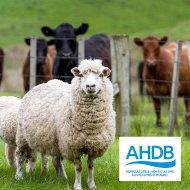
Industry-wide group will drive coordinated approach to health and welfare
A new UK-wide ruminant industry group is being established with the aim of advancing progress against endemic disease and reputational challenges in the sheep and cattle sectors.
The new Ruminant Health and Welfare Group (RHWG) will be formed on 1 April.
The creation of the group follows an industry consultation, facilitated by the Agriculture and Horticulture Development Board (AHDB) along with meat and livestock groups from Scotland, Wales and Northern Ireland.
All responders agreed that discussions on how to accelerate work to control endemic diseases were positive, with many believing that the creation of this new group will speed up work to control conditions like liver fluke, mastitis and lameness.
AHDB chief technical officer Rebecca Geraghty said: “Despite a number of worthwhile initiatives and significant progress in some areas to date, endemic diseases in ruminants continue to have a major impact on our industry’s performance and profitability.
“We are in unprecedented times. Due to Brexit and potential changes to both our operating environment and consumer preferences, we face challenges and opportunities which can be better managed by a robust ruminant industry with world-leading health and welfare.
“The broad agreement from discussions with government, devolved administrations and industry over the past 18 months is that the time is right for a clear, united UK-wide industry voice. This would act as a welcome driver for a simpler, more co-ordinated and more widely committed approach to ruminant health and welfare across all parts of the UK.”
Recruitment for a chair for RHWG started on 22 January. The closing date for applications is 20 February.



 The Animal and Plant Health Agency (APHA) has updated its online reporting service for dead wild birds.
The Animal and Plant Health Agency (APHA) has updated its online reporting service for dead wild birds.